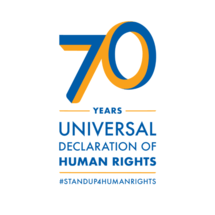
Scottish Refugee Council media officer Chris Afuakwah reflects on the history and relevance of the world’s most translated document on its 70th anniversary – the Universal Declaration of Human Rights.
10th December 2018 marks 70 years of the Universal Declaration of Human Rights, a huge milestone in human history. It was proclaimed by the UN General Assembly in Paris on 10th December 1948, following the horrors of WW2, and set out, for the first time, fundamental human rights to be universally protected. It is the most translated document in the world.
Watch now: we’ve put together a playlist of 10 videos that explain more about the Universal Declaration of Human Rights.
As we enter its 70th year, it faces untold challenges, as the world order we have come to know since its advent is threatened by seismic political shifts and populist uprisings, democracies democratically voting themselves into dictatorships, tightened borders, ageing populations, and cyber security. Yemen. Syria.
The so-called refugee crisis and rising inequality breeds polarising division, and people are suffering on our doorsteps, starkly displaying that human rights are not respected, or are only respected for some.
Borders battle against digital connections, politicians promise a return to the good old days, and the crowds cheer to take away their own liberties and rights to protect themselves from others, flags waving, screaming out for something new, but at what cost? 2019 will tell.
For us, for Scotland, for the UK, for Europe, 2019 means Brexit, in whichever form it does or does not take. The repercussions of which will undoubtedly affect our work and the lives of people we help, our staff and colleagues and friends.
Now, more than ever, we look to the Universal Declaration of Human Rights; to the good it promotes; to the hope it gives people; to the lives it has enabled people across the world to live; in the hope that it will remain unscathed in these uncertain times.
Across our social media, we are highlighting the anniversary and particularly Article 14, a section which is near and dear to our hearts. The right to this article can be traced directly to the atrocities of the Holocaust. Many countries who helped to draft the Universal Declaration of Human Rights were acutely aware that they had turned Jewish refugees away during this period. Article 14 exists to prevent this from happening again.
Article 14 (1): Everyone has the right to seek and to enjoy in other countries asylum from persecution.
————–
Watch now: Staff, volunteers and students at Scottish Refugee Council read Article 14 (1) of the Universal Declaration of Human Rights in 9 different languages.
————–
The ongoing so-called refugee crisis is a test of this article’s resolve, and indeed, is a test on our very humanity. Asylum seekers are being denied their human rights in plain sight, at borders around the world, in our streets and doorways. We will soon be launching a report on our Destitute Asylum Seeker Service (DASS) which outlines the violations of human rights which our asylum system subjects the people we work with to every day, right here in Glasgow.
As an organisation, we are committed to upholding refugees’ human rights. Equality, diversity and human rights are at our core. Action begins at home. Stand up for people who are being bullied, step in when you see harassment on the street, volunteer with a group who promote human rights. Have uncomfortable discussions over your dinner table. Stand with those who face reprisals for defending human rights, or those for whom human rights are denied altogether. Remain vigilant.
As Eleonore Roosevelt said, “Where, after all, do universal human rights begin? In small places, close to home – so close and so small that they cannot be seen on any maps of the world. Yet they are the world of the individual person; the neighbourhood he lives in; the school or college he attends; the factory, farm, or office where he works. Such are the places where every man, woman, and child seeks equal justice, equal opportunity, equal dignity without discrimination. Unless these rights have meaning there, they have little meaning anywhere. Without concerted citizen action to uphold them close to home, we shall look in vain for progress in the larger world.”
#StandUp4HumanRights, today, and every day.
——
You can read even more about Article 14 here.
